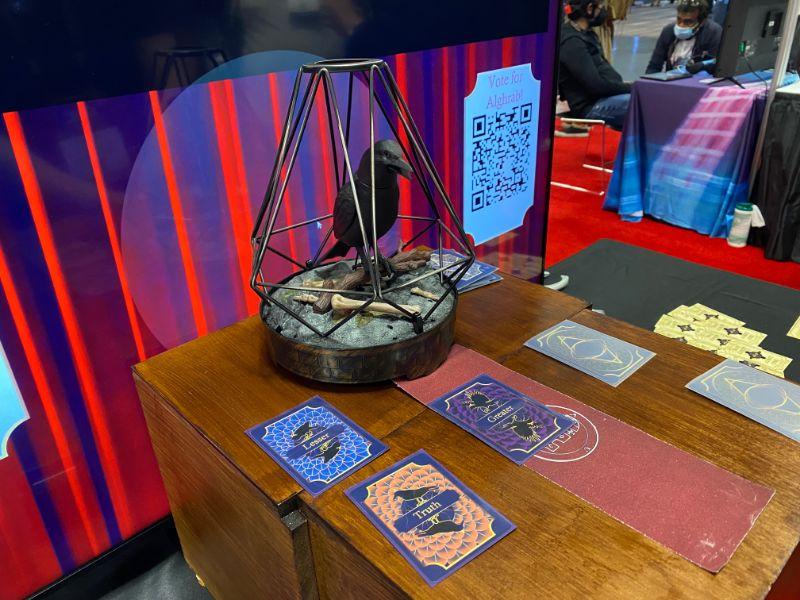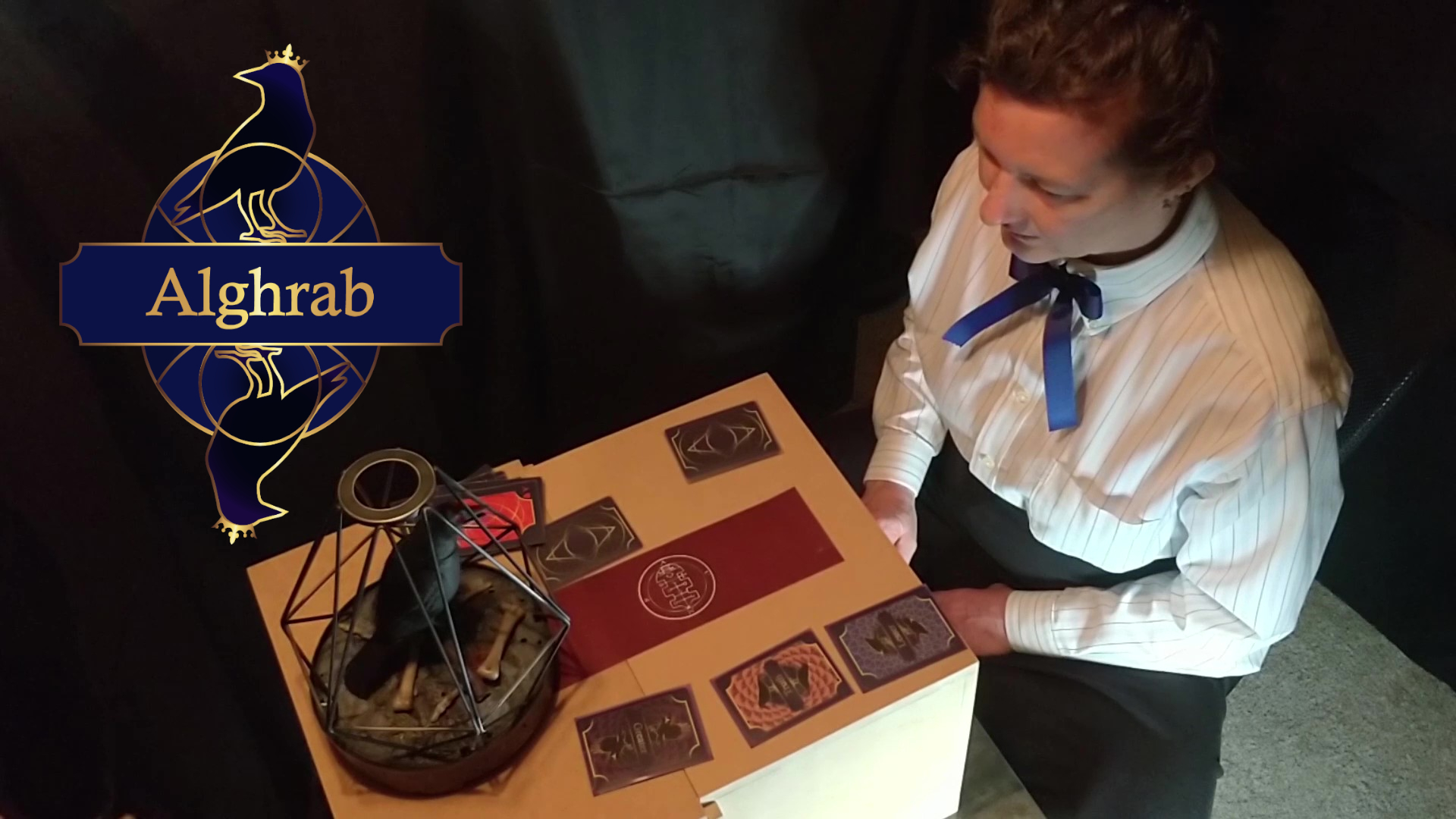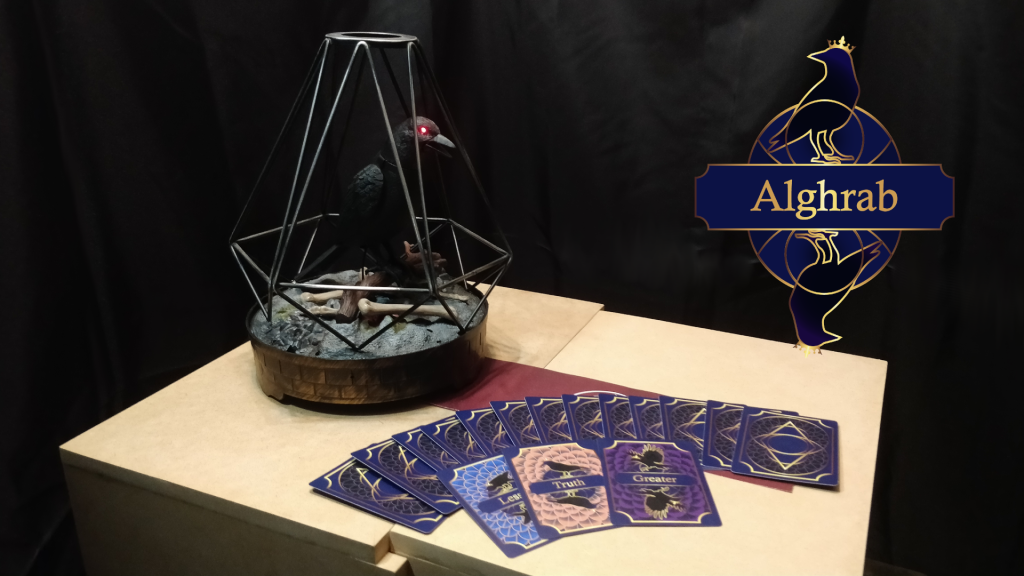Welcome to Affogata’s Indie Spotlight series covering the hits of tomorrow, before they know they are.
A one-of-a-kind alt.ctrl game, where you try to beat an arrogant animatronic crow at its own card game to earn a prophecy. Created with an entirely custom display table that doubles as storage, custom deck of playing cards, and over 200 voice lines, this animatronic crow comes alive to taunt, jeer, and poke fun at the player as they try to push through Alghrab’s web of tricks.
We interviewed Michael to hear about his creative process, how he collects player feedback, and here are his answers:
How do you start the creative process of coming up with a new game?
I feel like every game that I’ve designed has had a drastically different point of origin, but broadly I start with restrictions, which can be a LOT of different variables. Sometimes it’s a specific mechanic I want to build around, sometimes it’s a specific emotion I want players to feel, and in the case of Alghrab, it was completely centered around the physical prop. Adding restrictions helps keep me centered and I find expands the options that I can think of rather than a true blue sky design.

How and from whom do you get your game design feedback?
Playtesting, playtesting, playtesting. Especially playtesting for the blind new player experience. I usually have a short questionnaire that takes no more than 5 minutes to complete for them to answer after they play the game, but more importantly, I take notes of their body language, expressions, and exclamations while playing, which usually reveals more than the questionnaire does. If people are waiting around for something and you have a game that doesn’t take much time to play, I’ve asked complete strangers before, like while waiting for a plane flight!
How do you decide which player feedback to employ in your game?
When playtesting, if 2 or 3 players have a similar negative experience with a specific mechanic or moment, and it wasn’t an intentional decision to have that be a negative moment, that’s enough for me to alter that moment or mechanic. Besides that, I often have a strong vision or design goal for the experience, so I always try to take the feedback to enhance and refine on that goal.
Once applying feedback, do you keep asking for more comments?
Absolutely. There’s always something that can be improved, and a small change can have large ripples on the overall experience or unintended parts of the game.
What role does player feedback take in creating indie games and what does it look like?
I think the amount and specific role that player feedback takes in creating indie games drastically depends on the indie game and developer. However, when it comes to my design and the games I’ve created, I find player feedback to be the lifeblood of indie games. If players feel like their voices are being heard, I believe that they are more likely to continue playing your game, driving balance updates and content.

How do you approach conflicting feedback from different gamers?
Once again, it partially goes back to the design goal that I have while designing my games. The feedback that more closely aligns with my design goal, or target audience is more likely to be implemented. That being said, the more important part of the feedback is not what the player says, but why the player says it, which is admittedly difficult to figure out. Oftentimes the conflicting feedback is coming from a different expectation of the game, so adding WAY MORE information, hints, clues, and tonal markings can help manage a player’s perception of the mechanic, which alters feedback, even if no actual mechanics ever changed. Unfortunately, this is very vague, but player feedback is SO varied and situational that it’s hard to give specific answers.
If you could improve the way you gather feedback, what would you do?
The main limiting factor for the way I currently gather feedback is limited by physical human interactions since so much of my data and information comes from categorical data in expression, body language, exclamations, and so on. I’d love to just be able to cast a wider net and get more playtests and more data in the same amount of time.
Subscribe to our blog to read more stories about amazing creators from passionate professionals.
